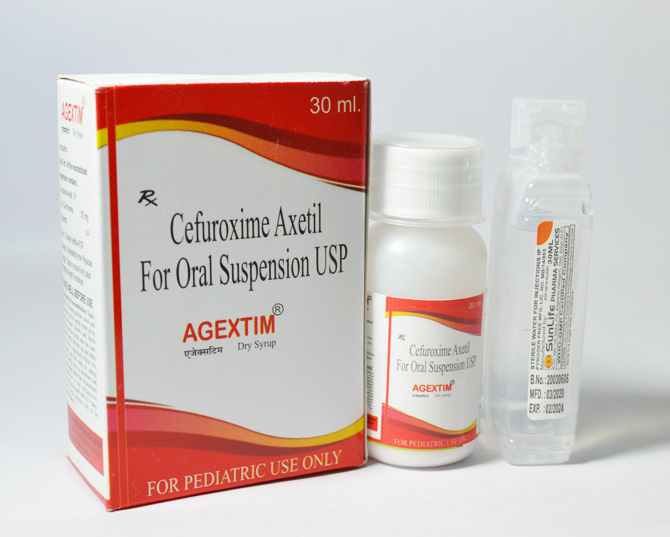
MRP : 125
Indications
AGEXTIM-125 (Cefuroxime Axetil 125 mg for oral suspension) Dry Syrup from Agex Laboratories is indicated for the treatment of patients with mild to moderate infections caused by susceptible strains of the designated microorganisms in the conditions given below:
Contraindications
AGEXTIM-125 (Cefuroxime Axetil 125 mg for Oral Suspension) Dry Syrup is contraindicated in patients with known allergy to the cephalosporin group of antibiotics.
Precautions & Warnings
AGEXTIM-125 (Cefuroxime Axetil 125 mg for Oral Suspension) Dry Syrup is and AGEXTIM tablets are not Bioequivalent and are therefore not substituted on a miligram per miligram basis.
A careful inquire is recommended before Cefuroxime Axetil therapy is instituted. It is needed to determine if the patient has had previous hyper-sensitivity reactions to Cefuroxime Axetil products, other Cephalosporins, Penicilllins, or other drugs
Clostridium difficile associated diarrhea (CDAD) has been reported with use of nearly all antibacterial agents, including Cefuroxime Axetil, and may range in severity from mild diarrhea to fatal colitis. Treatment with antibacterial agents alters the normal flora of the colon leading to overgrowth of C. difficile.
C. difficile produces toxins A and B which contribute to the development of CDAD. Hypertoxin producing strains of C. difficile cause increased morbidity and mortality, as these infections can be refractory to antimicrobial therapy and may require colectomy. CDAD must be considered in all patients who present with diarrhea following antibiotic use. Careful medical history is necessary since CDAD has been reported to occur over 2 months after the administration of antibacterial agents.
If CDAD is suspected or confirmed, ongoing antibiotic use not directed against C. difficile may need to be discontinued. Appropriate fluid and electrolyte management, protein supplementation, antibiotic treatment of C. difficile, and surgical evaluation should be instituted as clinically indicated.
Prolonged administration of AGEXTIM may result in overgrowth of nonsusceptible microorganisms. If superinfection occurs during therapy, appropriate measures should be taken.
AGEXTIM should be given with caution to patients receiving concurrent treatment with potent diuretics because these diuretics are suspected of adversely affecting renal function.
AGEXTIM should be prescribed with caution in individuals with a history of colitis. The safety and effectiveness of AGEXTIM have not been established in patients with gastrointestinal malabsorption.
Cephalosporins may be associated with a fall in prothrombin activity. Those at risk include patients with renal or hepatic impairment, or poor nutritional state, as well as patients receiving a protracted course of antimicrobial therapy, and patients previously stabilized on anticoagulant therapy. Prothrombin time should be monitored in patients at risk and exogenous Vitamin K administered as indicated.
Prescribing AGEXTIM in the absence of a proven or strongly suspected bacterial infection or a prophylactic indication is unlikely to provide benefit to the patient and increases the risk of the development of drug-resistant bacteria.
Nursing Mothers: Because cefuroxime is excreted in human milk, consideration should be given to discontinuing nursing temporarily during treatment with Cefuroxime Axetil.
Drug Interactions
Concomitant administration of probenecid with Cefuroxime Axetil increases the area under the serum concentration versus time curve by 50%. The peak serum cefuroxime concentration after a 1.5 g single dose is greater when taken with 1 g of probenecid (mean = 14.8 mcg/mL) than without probenecid (mean = 12.2 mcg/mL).
Drugs that reduce gastric acidity may result in a lower bioavailability of Cefuroxime Axetil tablets compared with that of fasting state and tend to cancel the effect of postprandial absorption.
In common with other antibiotics, Cefuroxime Axetil may affect the gut flora, leading to lower estrogen reabsorption and reduced efficacy of combined oral estrogen/ progesterone contraceptives.
In common with other antibiotics, Cefuroxime Axetil may affect the gut flora, leading to lower estrogen reabsorption and reduced efficacy of combined oral estrogen/ progesterone contraceptives.
Dosage & Administration
Children (Pediatric Use)
Otitis Media: 3 months to 12 years: 250 mg tablet orally twice a day for 10 days or 15 mg/kg of the suspension twice a day for 10 days; maximum daily dose is 1000 mg Sinusitis: 3 months to 12 years: 250 mg tablet orally twice a day for 10 days or 15 mg/kg of the suspension orally twice a day for 10 to 14 days; maximum daily dose is 1000 mg 13 years or older: Adult dose Skin and Structure Infection: 3 months to 12 years: 15 mg/kg of the suspension orally twice a day for 10 days; maximum daily dose is 1000 mg Impetigo: 3 months to 12 years: 15 mg/kg of the suspension orally twice a day for 10 days; maximum daily dose is 1000 mg Tonsillitis/Pharyngitis: 3 months to 12 years: 10 mg/kg of the suspension twice a day for 10 days; maximum daily dose is 500 mg 13 years or older: Adult dose Bacterial Infection: 3 months to 12 years: Suspension: 10 to 15 mg/kg orally twice a day (maximum dose 1000 mg/day). Tablets: 250 mg orally twice a day 13 years or older: Adult dose
Presentation
AGEXTIM DRY SYRUP: 30 mL Bottle of Oral Suspension with Distilled Water